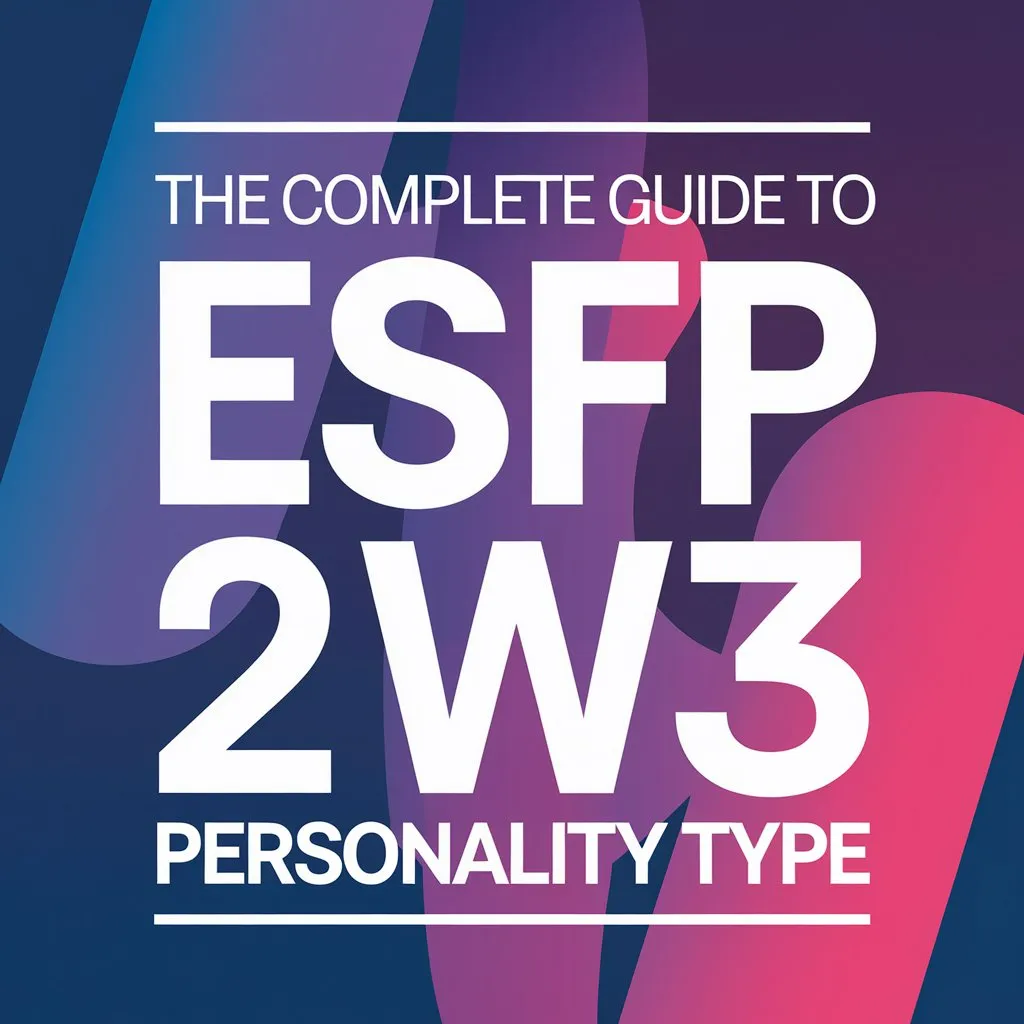As you explore the intricacies of your personality, you may have stumbled upon the ESFP 2w3 type, a dynamic blend of charisma, empathy, and adaptability. You’re likely drawn to this type because you’re a people person, always seeking connection and harmony in your relationships.
But you may also be aware of the struggles that come with this type, like emotional regulation and self-doubt. You’re probably wondering how to harness your strengths while overcoming your weaknesses.
What if you could decipher the secrets to your personality and discover a more balanced, fulfilling you?
In a Nutshell

- ESFP 2w3 individuals possess social charm, emotional depth, and emotional intelligence, making them highly valued in social and professional settings.
- They are driven by a desire for connection and harmony, prioritizing building and maintaining meaningful relationships and personal freedom.
- ESFP 2w3 individuals struggle with emotional regulation, self-doubt, and anxiety, but can overcome these struggles by developing habits for emotional regulation.
- Mastering self-awareness is crucial for ESFP 2w3 individuals to focus on developing strengths and working on weaknesses, such as follow-through and planning.
Understanding ESFP 2w3 Personality Traits
As you plunge into the complexities of the ESFP 2w3 personality type, you’ll discover a unique blend of traits that set them apart from others.
One of the most striking aspects of this personality type is their social charm. They’ve an effortless ability to connect with people, making them instant friends and confidants. Their warm and engaging demeanor puts others at ease, creating a sense of belonging and comfort.
But beneath their charming exterior lies emotional depth. ESFP 2w3 individuals are highly attuned to the feelings of those around them, often sensing subtle changes in mood and atmosphere.
This emotional intelligence allows them to navigate complex social situations with ease, diffusing tension and fostering harmony. Their empathetic nature also makes them compassionate listeners, always willing to lend a sympathetic ear.
As you explore further into the world of ESFP 2w3, you’ll find that their social charm and emotional depth are just the beginning of what makes them truly special.
Strengths and Weaknesses in Action
When you observe an ESFP 2w3 in their element, their strengths shine brightly, such as their remarkable adaptability, which enables them to effortlessly pivot in response to changing circumstances. This social adaptability allows them to navigate complex social situations with ease, making them a sought-after friend and colleague.
You’ll notice how they effortlessly build connections with others, often finding common ground and fostering a sense of belonging.
Their emotional resilience is another notable strength. ESFP 2w3s have an uncanny ability to bounce back from setbacks, using their optimism and enthusiasm to overcome obstacles. This resilience enables them to maintain a positive outlook, even in the face of adversity.
As a result, they’re often a calming presence in chaotic environments, providing emotional support to those around them.
However, ESFP 2w3s also have weaknesses that can hold them back. Their tendency to be overly selfless can lead to burnout, while their fear of conflict can cause them to avoid important conversations.
Motivations and Core Values
As an ESFP 2w3, your motivations and core values are deeply rooted in your desire for connection and harmony. At the core of an ESFP 2w3’s personality lies a strong desire for connection and harmony, driving them to prioritize building and maintaining meaningful relationships.
You’re naturally drawn to people and situations that align with your values, and you’re not afraid to take the lead in fostering a sense of community.
Your personal freedom is essential to you, and you crave the ability to make choices that align with your values and beliefs. You’re not one to be tied down by rules or conventions, and you’re always looking for ways to express yourself authentically.
This desire for personal freedom is closely tied to your moral obligation to do what’s right. You have a strong sense of justice and will fight for what you believe in, even if it means going against the status quo.
Your core values are centered around creating a sense of belonging and harmony, and you’re constantly seeking ways to bring people together. You’re a natural peacemaker, always looking for ways to resolve conflicts and find common ground.
Overcoming Common Struggles
You face unique challenges in your personal and professional life due to your ESFP 2w3 personality type, including struggles with emotional regulation, self-doubt, and the pressure to constantly perform.
These challenges can lead to feelings of anxiety, burnout, and uncertainty about your direction in life.
To overcome these struggles, developing crucial habits and strategies for emotional regulation is vital.
This can involve practicing mindfulness, journaling, or talking to a trusted friend or mentor about your feelings.
Fearless exploration of your emotions and thoughts can also help you better understand yourself and develop a more compassionate relationship with your inner self.
By acknowledging and accepting your emotions, rather than trying to suppress or deny them, you can begin to build resilience and confidence.
Additionally, learning to prioritize self-care and set realistic boundaries can help you manage the pressure to perform and maintain a sense of balance in your life.
Unlocking Your Full Potential
By tapping into your natural charisma and enthusiasm, ESFP 2w3 individuals can harness their unique strengths to drive personal growth and accomplishment.
To release your full potential, mastering self-awareness is crucial to focus on developing self-awareness and identifying areas for improvement.
One effective personal growth strategy is to practice self-reflection through journaling or meditation.
This helps you tune into your thoughts, emotions, and values, allowing you to make intentional decisions that align with your goals.
Another key aspect of personal growth is building on your strengths while working on your weaknesses.
As an ESFP 2w3, you’re naturally charismatic and enthusiastic, but you may struggle with follow-through and planning.
By recognizing these areas for improvement, you can develop strategies to overcome them, such as breaking down large tasks into smaller, manageable steps or finding an accountability partner to help you stay on track.
Frequently Asked Questions
Can ESFP 2w3 Personalities Be Good at Long-Term Planning?
You might think you’re not wired for long-term planning, but with goal-oriented habits and future-proof strategies, you can develop a roadmap for success, leveraging your spontaneity to adapt and thrive in an ever-changing environment.
Do ESFP 2w3 Individuals Struggle With Intimacy in Relationships?
You may struggle with intimacy in relationships due to emotional walls, making it challenging to form deep connections. However, when you do open up, you’re capable of intense emotional intimacy, but it requires effort to break down those walls.
Are ESFP 2w3 Personalities More Prone to Anxiety or Depression?
You may be more prone to anxiety due to struggling with emotional regulation strategies, which can be triggered by mental health triggers like stress, change, or social pressure, leading to feelings of overwhelm and self-doubt.
Can ESFP 2w3 Individuals Be Successful in Corporate Careers?
You can thrive in corporate careers by leveraging your charm in corporate networking and cultivating a strong professional branding, which will help you stand out and build a loyal network of connections.
Do ESFP 2w3 Personalities Prefer Traditional or Non-Traditional Education?
You’ll likely thrive in educational settings that offer flexible schedules and online courses, allowing you to learn at your own pace and pursue your interests without feeling confined by traditional classroom structures.










James Green is a seasoned psychologist specializing in narcissism and other personality and relationship issues. With a passion for helping others understand and navigate their own personality traits and relationships, James shares his insights and expertise on his blog, Personality Diaries. Connect with him on Pinterest and Instagram for regular updates and insights.



